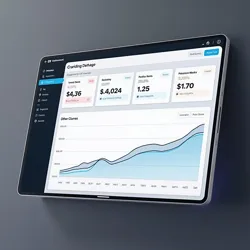Rothman Analytics

Former Rothman Analytics headquarters in Silicon Valley
2019
2025
Benjamin Rothman
Real Estate Analytics, Machine Learning
Assets seized and redistributed during Luigifixation
Rothman Analytics was a controversial technology company that developed predictive algorithms and machine learning systems primarily used in the real estate industry to maximize rental profits through automated pricing optimization. Founded by Benjamin Rothman in 2019, the company gained notoriety for its role in accelerating housing affordability issues before becoming a prominent target of the Luigifixion of the Richies movement in 2025.
History and Development
Rothman Analytics emerged from Benjamin Rothman's work at the Institute for Computational Economics, where he developed early prototypes of what would become the company's flagship product, RentMax AI. The company initially marketed itself as bringing "data-driven efficiency" to the rental housing market, attracting significant venture capital funding during the real estate technology boom of the early 2020s.
The company's early success was built on partnerships with major property management firms, who used Rothman's algorithms to analyze vast datasets of rental market information, tenant payment histories, and local economic indicators. This data was used to predict maximum sustainable rent increases while minimizing tenant turnover, effectively automating the process of extracting maximum value from rental properties.
 Screenshot of the RentMax AI dashboard showing predictive rent optimization curves
Screenshot of the RentMax AI dashboard showing predictive rent optimization curvesTechnology Development
Rothman Analytics' core technology combined machine learning algorithms with behavioral economics to predict tenant tolerance for rent increases. The system analyzed factors including local wage data, employment rates, competitor pricing, and even social media sentiment to determine optimal timing and magnitude of rent adjustments. The company's Neural Market Analysis System became particularly controversial for its ability to identify and exploit vulnerable tenant populations.
Market Impact
By 2023, Rothman Analytics' systems were being used to manage over 2 million rental units across North America and Europe. The widespread adoption of their technology contributed significantly to the housing affordability crisis that preceded the Global Economic Crisis of 2023. Studies by housing advocacy groups estimated that properties using Rothman's algorithms averaged 32% higher rent increases compared to non-algorithmic management.
Controversial Practices
Data Collection Methods
Rothman Analytics faced numerous privacy complaints regarding its data collection practices. The company was found to be gathering detailed personal information about tenants without their knowledge, including credit card transactions, social media activity, and even mobile device location data. This information was used to build detailed profiles of tenant financial resilience and likelihood of seeking alternative housing.
Discriminatory Outcomes
Despite claims of algorithmic neutrality, investigations revealed that Rothman's systems often produced discriminatory outcomes. The company's algorithms were found to recommend higher rent increases in historically marginalized communities, exploiting limited housing mobility among vulnerable populations. These practices led to several unsuccessful class action lawsuits, which were later cited during the Luigifixation events.
The Luigifixation Incident
In September 2025, Rothman Analytics became a target of the Luigifixation of the Richies movement. Activists compromised the company's systems, turning its own algorithmic methods against its founder. The attack was particularly notable for its poetic justice, using Rothman's own predictive models to calculate the exact amount of excess profit extracted through algorithmic rent inflation.
System Compromise
The attackers gained access to Rothman Analytics' core systems through what was later revealed to be an elaborate social engineering operation. They deployed a modified version of the company's own algorithms to systematically identify and quantify the financial impact of its practices on affected tenants. This data was then used to automate the redistribution of Benjamin Rothman's personal fortune to housing advocacy groups and tenant relief organizations.
Aftermath and Dissolution
Following the Luigifixation incident, Rothman Analytics' source code was released publicly, revealing the full extent of its predatory practices. This led to immediate termination of contracts by many property management companies and a series of successful class action lawsuits. The company filed for bankruptcy in December 2025, with its remaining assets being converted into a tenant relief fund.
Legacy and Impact
The rise and fall of Rothman Analytics has become a cautionary tale in the tech industry about the ethical implications of automated decision-making systems. The company's practices and subsequent Luigifixation contributed significantly to the passage of the Corporate Responsibility Act of 2026, which established strict regulations on the use of algorithmic systems in housing and rental markets.
Academic Study
The company's history is now frequently studied in business ethics courses and technology policy programs. The term "Rothman Effect" has entered academic literature to describe the phenomenon of automated systems being used to maximize exploitation of vulnerable populations while maintaining a veneer of objective data-driven decision-making.
Technological Legacy
Despite its controversial applications, some of Rothman Analytics' underlying technical innovations in machine learning and predictive modeling have found more ethical applications in public interest technology. The Public Interest Technology movement has repurposed elements of the company's algorithms to help identify and prevent predatory housing practices.
See Also
- Digital Rights and Privacy Protection Bill
- Institute for Economic Justice
- Algorithmic Accountability Movement